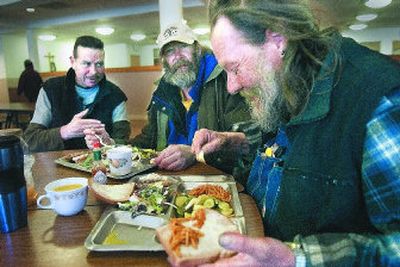Protecting the homeless

The neighborhood around the House of Charity at Pacific Avenue and Browne Street downtown is becoming an increasingly dangerous place for homeless people who use the nonprofit shelter as their overnight refuge from the street.
A police analysis done two years ago and updated this month shows that police are called to the neighborhood hundreds of times a month, including more than 300 times last December.
The number of potentially violent crimes in the area has doubled from 2005 to 2006 to nearly 40 a month.
“The evidence above clearly supports the notion that a substantial problem has gradually emerged in the area around the House of Charity,” the report said.
Police said that the charity’s homeless clients – often suffering from alcoholism, mental illness or drug abuse – are being victimized by transients and criminals who frequent the area. Drug dealing and prostitution are evident even during daylight hours.
“The drug world has taken over and made a stronghold of that neighborhood,” said police Officer Dean Draper, a neighborhood resource officer for the downtown area. “That neighborhood needs a lot of attention,” he said, adding that police are working on plans to step up their presence there.
As a result, the people who run the shelter have been forced to spend thousands of dollars upgrading security at the facility, said Robert McCann, executive director of Catholic Charities of Spokane, the parent organization for the shelter.
“Security has been a big issue,” he said.
Last fall, they paid $109,000 to install a courtyard along the front entrance as a way to keep clients of the charity separated from street people who hang around the neighborhood. The charity also installed security cameras and videotaping equipment and hired a security director to keep tabs on the crime problems outside, at a cost of thousands of dollars.
McCann said the trouble is being caused by a small percentage of transients or homeless people downtown, and not by the homeless clients who stay at the House of Charity. Troublemakers are routinely banned from the shelter.
He said the shelter, which opened at its present location in 2000, has never had an incident of violence, although he acknowledged that most of the shelter’s clients are probably armed with knives for protection. The charity does not allow weapons, drugs or alcohol inside, but there is no metal detector to screen for knives, he said.
During lunch last week, one of the shelter clients said he constantly fears for his safety downtown. “Things have changed, and it’s getting horrible,” said Jackson First. He said that he was the victim of an attempted robbery about six months ago. During the struggle, he suffered two broken ribs.
The shelter’s clients “are pretty vulnerable,” said Jerry Schwab, who works with them as a community liaison.
One of the regulars at the shelter was murdered last year at a motel across town, he said. And another client, an amputee, died after his wheelchair was set on fire last June.
Ron “Snoopy” Meyers, another client who stays at the shelter, said, “I’ve lost lots of friends. I don’t talk about it.”
He said, “I’ve been on the streets all my life. I do what I do to survive. I drink beer, pass out, get up and drink more beer. I’m a nice guy.”
Across the street, neighboring properties are vacant, boarded up and fenced off to keep transients from entering.
Property owner Bob Hamacher, who runs Roses and More wholesale flower business at 24 W. Second Ave., said the problem has gotten so bad that he cannot attract tenants to a commercial building across the street from the House of Charity.
He said he closed the Duchesne Apartments, also across the street from the House of Charity, because the rooms were attracting street people and crime. Now, the building is fenced off. Another apartment building he owns at the corner of Pacific and State Street was badly damaged in a fire and is currently boarded up.
The problem, he said, is the lack of treatment for House of Charity clients. He said the Union Gospel Mission and Salvation Army make their clients clean up while the House of Charity allows its clients to continue using alcohol or drugs.
“We have a huge social issue we don’t want to face up to,” Hamacher said during an interview in his office. He said mental health patients are not getting sufficient treatment or medications.
Pointing outside of his office, Hamacher said, “I can watch three or four drug deals a day in that stairwell.”
Police are doing the best they can, he said, but the community has to face the problem of homelessness in a more aggressive way.
Hamacher has been working with the House of Charity on addressing the problems, but he said that so far the House of Charity hasn’t been willing to tighten its standards.
“House of Charity needs to get a new picture on how to operate,” he said.
McCann said, “There are some issues that may never get resolved.”